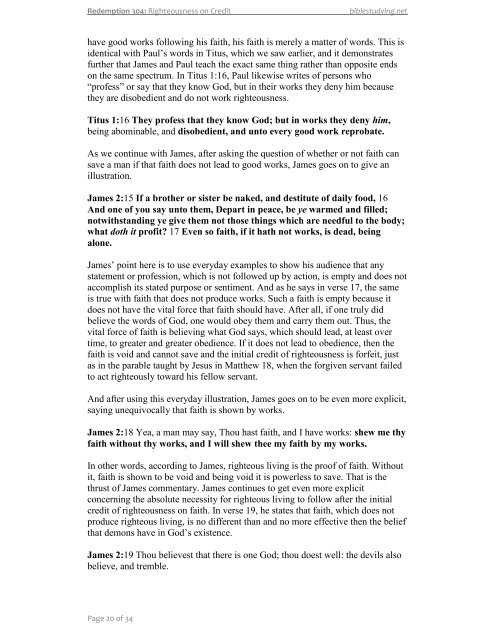righteousness-credit
righteousness-credit
righteousness-credit
Create successful ePaper yourself
Turn your PDF publications into a flip-book with our unique Google optimized e-Paper software.
Redemption 304: Righteousness on Credit<br />
biblestudying.net<br />
have good works following his faith, his faith is merely a matter of words. This is<br />
identical with Paul’s words in Titus, which we saw earlier, and it demonstrates<br />
further that James and Paul teach the exact same thing rather than opposite ends<br />
on the same spectrum. In Titus 1:16, Paul likewise writes of persons who<br />
“profess” or say that they know God, but in their works they deny him because<br />
they are disobedient and do not work <strong>righteousness</strong>.<br />
Titus 1:16 They profess that they know God; but in works they deny him,<br />
being abominable, and disobedient, and unto every good work reprobate.<br />
As we continue with James, after asking the question of whether or not faith can<br />
save a man if that faith does not lead to good works, James goes on to give an<br />
illustration.<br />
James 2:15 If a brother or sister be naked, and destitute of daily food, 16<br />
And one of you say unto them, Depart in peace, be ye warmed and filled;<br />
notwithstanding ye give them not those things which are needful to the body;<br />
what doth it profit? 17 Even so faith, if it hath not works, is dead, being<br />
alone.<br />
James’ point here is to use everyday examples to show his audience that any<br />
statement or profession, which is not followed up by action, is empty and does not<br />
accomplish its stated purpose or sentiment. And as he says in verse 17, the same<br />
is true with faith that does not produce works. Such a faith is empty because it<br />
does not have the vital force that faith should have. After all, if one truly did<br />
believe the words of God, one would obey them and carry them out. Thus, the<br />
vital force of faith is believing what God says, which should lead, at least over<br />
time, to greater and greater obedience. If it does not lead to obedience, then the<br />
faith is void and cannot save and the initial <strong>credit</strong> of <strong>righteousness</strong> is forfeit, just<br />
as in the parable taught by Jesus in Matthew 18, when the forgiven servant failed<br />
to act righteously toward his fellow servant.<br />
And after using this everyday illustration, James goes on to be even more explicit,<br />
saying unequivocally that faith is shown by works.<br />
James 2:18 Yea, a man may say, Thou hast faith, and I have works: shew me thy<br />
faith without thy works, and I will shew thee my faith by my works.<br />
In other words, according to James, righteous living is the proof of faith. Without<br />
it, faith is shown to be void and being void it is powerless to save. That is the<br />
thrust of James commentary. James continues to get even more explicit<br />
concerning the absolute necessity for righteous living to follow after the initial<br />
<strong>credit</strong> of <strong>righteousness</strong> on faith. In verse 19, he states that faith, which does not<br />
produce righteous living, is no different than and no more effective then the belief<br />
that demons have in God’s existence.<br />
James 2:19 Thou believest that there is one God; thou doest well: the devils also<br />
believe, and tremble.<br />
Page 20 of 34


